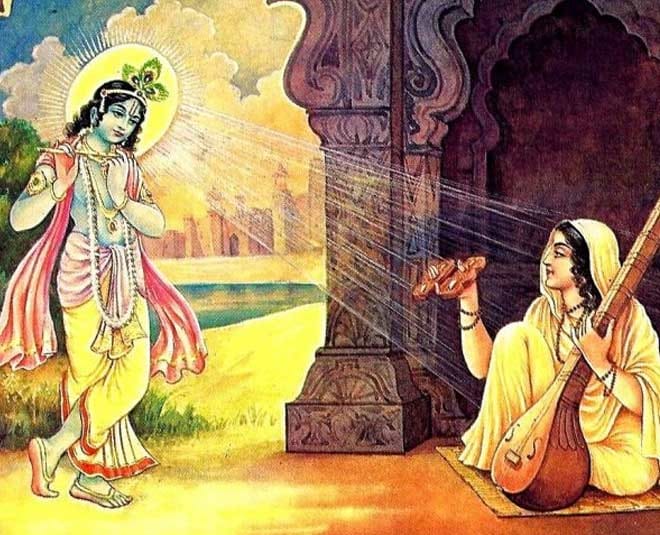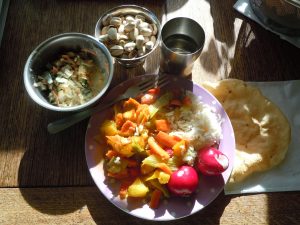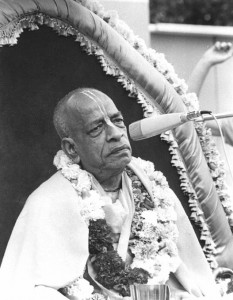
“Mirabai was born into a Rathore Rajput royal family in Kudki (modern-day Pali district of Rajasthan), and spent her childhood in Merta. She is mentioned in Bhaktamal, confirming that she was widely known and a cherished figure in the Bhakti movement by about 1600 CE.
Most legends about Mirabai mention her fearless disregard for social and family conventions, her devotion to Krishna, her treatment of Krishna as her husband, and her persecution by her in-laws for her religious devotion. She has been the subject of numerous folk tales and hagiographic legends, which are inconsistent or widely different in details.
Millions of devotional hymns in passionate praise of Krishna are attributed to Meerabai in the Indian tradition, but just a few hundred are believed to be authentic by scholars, and the earliest written records suggest that except for two hymns, most were first written down in the 18th century. Many poems attributed to Meera were likely composed later by others who admired Meera. These hymns are a type of bhajan, and are very famous across India.”
https://en.m.wikipedia.org/wiki/Mirabai
Śrīla Prabhupāda Glorifies Mira Bai
“The celebrated Mīrā Bāī was a staunch devotee of Lord Kṛṣṇa as the great lifter of Govardhana Hill.”
(Śrīla Prabhupāda, Śrīmad-Bhāgavatam 2.3.15 » Purport)
https://www.prabhupada.io/books/sb/2/3/15
“Indian man: Prabhupāda? Jīva Gosvāmī was the guru of Mira?
Prabhupāda: No. I do not know who is the guru of Mirabhai. But Mirabhai, from the childhood, she was a devotee. But I do not hear anyone as her guru.”
(Śrīla Prabhupāda Room Conversation – December 26, 1976, Bombay]
https://prabhupadabooks.com/conversations/1976/dec/bombay/december/26/1976-1
“Indian: Or any bhajana of God. Then, you see, understand language and everything. You see, if it is just like Mirabhai and crying, tear comes from my face, and laughing, very instant laughing, laugh…
Prabhupāda: Yes.
Indian: And there is no other progress.
Prabhupāda: No, that is aṣṭa-sāttvika-vikāra (CC Antya 14.99).
Indian: Sāttvika-vikāra.
Prabhupāda: Yes, that is called vikāra, transformation of spiritual platform. Yes.
Indian: But still there is something more, something more.
Prabhupāda: No, that is the… When one cries, transformed, that means he’s realizing Kṛṣṇa.
Indian: Yes, yes…
Prabhupāda: He’s realizing like that. That is realization. Caitanya Mahāprabhu also used to do that. That is highest stage, mahā-bhāva.”
(Śrīla Prabhupāda Lecture on Bhagavad-gītā 2.1 — Ahmedabad, December 7, 1972)
https://prabhupadabooks.com/classes/bg/2/1/ahmedabad/december/07/1972
“In my childhood I imitated my father. He was worshiping Deity of Kṛṣṇa. So I asked him, “My dear father, I shall worship. Give me the Deity of Kṛṣṇa.” So he gave me a little Deity of Kṛṣṇa and Rādhā and I was imitating. So beginning of life… So these are actually facts. Mahārāja Parīkṣit also, he was playing with Kṛṣṇa, Kṛṣṇa dolls. Just like Mirabhai. She was playing with Kṛṣṇa doll and later on she became a very high-grade devotee. So these chances are there.”
(Srīla Prabhupāda Lecture on Bhagavad-gītā 6.40-42 — New York, September 16, 1966)
https://prabhupadabooks.com/classes/bg/6/40-42/new_york/september/16/1966
Reporter: Yeah. You think Mirabhai was a bhakta?
Prabhupāda: Yes. He was devotee…, she was a devotee.
Reporter: Yes. She had this quality of presence.
Prabhupāda: Oh, yes.
Reporter: Yes. Direct dialogue.
Prabhupāda: Oh, yes. Otherwise, how she could tell the king that, “No, you are not husband; I have got already my husband, Giridhārī.”
Reporter: Hm. Yes. And the king sent the poison. Ah? And she drank it.
Prabhupāda: Yes. I think that you people, you can understand this philosophy very nicely and do good to the people. What is the name of your paper?
Reporter: Researchers.
Prabhupāda: Researchers.
Reporter: Yes
(Śrīla Prabhupāda >> Room Conversation with Reporter from Researchers Magazine — July 24, 1973, London)
https://prabhupadabooks.com/conversations/1973/jul/with_reporter_from_researchers_magazine/london/july/24/1973?d=1&f=360728
“Allen Ginsberg: So who is the most perfect of the Vaiṣṇava poets? That would be Mīrā?
Guest (1): Mīrā was a devotee. She was a Vaiṣṇava.
Prabhupāda: Yes. Devotee means…
Guest (1): Vaiṣṇava. She was, Mīrā, Kṛṣṇa devotee. Oh, her songs has called me.
Allen Ginsberg: Have you used her songs here at all?
Prabhupāda: Yes, in India it is very popular, Mīrā’s song. Mostly they are written in Hindi, and some of them have been interpolated. But Mīrā was a devotee. She saw Rūpa Gosvāmī, a contemporary. She has written many poetry about Lord Caitanya.
Allen Ginsberg: Oh, she was a contemporary of Caitanya?
Prabhupāda: Yes.
Allen Ginsberg: Did they meet?
Prabhupāda: No. She appreciated that Lord Caitanya is Kṛṣṇa, and she has written one poetry, song, that “Now You have left aside Your flute, and You have taken the sannyāsī rod.” In that way she has written nice poetry. “And where is Your hair and peacock feather? Now You are bald-headed.” In this way. So Mīrā appreciated. Her life is also very excellent. Her father gave her a small Kṛṣṇa doll to play, and she developed love for Kṛṣṇa as husband. So when she was married… She was princess, daughter of king, and she was married with another prince.”
(Śrīla Prabhupāda Room Conversation with Allen Ginsberg — May 13, 1969, Columbus, Ohio)
https://prabhupadabooks.com/conversations/1969/may/with_allen_ginsberg/columbus/may/13/1969



